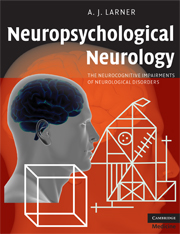Book contents
- Frontmatter
- Contents
- Acknowledgements
- Introduction
- 1 Cognitive function, neuropsychological evaluation, and syndromes of cognitive impairment
- 2 Neurodegenerative disorders
- 3 Cerebrovascular disease: vascular dementia and vascular cognitive impairment
- 4 The epilepsies
- 5 Neurogenetic disorders
- 6 Inflammatory, immune-mediated, and systemic disorders
- 7 Structural brain lesions
- 8 Endocrine, metabolic, and toxin-related disorders
- 9 Infective disorders
- 10 Neuromuscular disorders
- Index
- References
Introduction
Published online by Cambridge University Press: 15 December 2009
- Frontmatter
- Contents
- Acknowledgements
- Introduction
- 1 Cognitive function, neuropsychological evaluation, and syndromes of cognitive impairment
- 2 Neurodegenerative disorders
- 3 Cerebrovascular disease: vascular dementia and vascular cognitive impairment
- 4 The epilepsies
- 5 Neurogenetic disorders
- 6 Inflammatory, immune-mediated, and systemic disorders
- 7 Structural brain lesions
- 8 Endocrine, metabolic, and toxin-related disorders
- 9 Infective disorders
- 10 Neuromuscular disorders
- Index
- References
Summary
The aim of this book is to review what is known about the neuropsychological or neurocognitive impairments which occur in neurological disorders, and in some general medical conditions which may be seen by neurologists. Such neuropsychological deficits are of course relatively well defined in those disorders which present with, or whose clinical features are largely restricted to, cognitive impairment, specifically the dementia syndromes, of both neurodegenerative and vascular aetiology, and these account for a fair proportion of this book. However, cognitive dysfunction may also occur in other neurological disorders, an observation which may have implications for both clinical diagnosis and case management. Few texts have, to my knowledge, specifically addressed this area (e.g. Grant & Adams, 1996; Green, 2000; Harrison & Owen, 2002), and some only in passing. To be sure, there are a number of excellent texts which tackle the classical neuropsychological syndromes such as amnesia, aphasia, alexia, agraphia, apraxia, agnosia, and executive dysfunction (e.g. Baddeley et al., 1995; Benson & Ardila, 1996; Kirshner, 2002; Heilman & Valenstein, 2003). The case-study approach to the neuropsychological features of neurological disorders (e.g. Kapur, 1996; Ogden, 2005) has even spilled over into populist texts, but though such in-depth case studies are informative, they may not immediately correspond to the case mix seen by clinical neurologists. Textbooks of neurology may mention dementia as a feature of certain neurological diseases, often in a rather diffuse way.
There is a perception in some quarters that neuropsychology is something rather separate from clinical neurology.
Information
- Type
- Chapter
- Information
- Neuropsychological NeurologyThe Neurocognitive Impairments of Neurological Disorders, pp. 1 - 5Publisher: Cambridge University PressPrint publication year: 2008
